Tooth Extractions in Kemptville, ON
At Yazdani Family Dentistry in Kemptville, we specialize in a range of dental extraction procedures, from wisdom teeth removal to addressing teeth compromised by damage or infection. Our expert team is dedicated to ensuring your comfort and well-being throughout the entire process.
To Book an Appointment
When Tooth Extraction is Necessary
A Tooth Extraction in Kemptville May Be the Only Option
A tooth extraction becomes necessary when a tooth is severely damaged or decayed beyond repair through conventional treatments like fillings or crowns. While preserving natural teeth is our priority, extraction may be required in severe cases to prevent infections or other serious oral health issues.
At Yazdani Family Dentistry in Kemptville, our skilled team performs tooth extractions with utmost care and precision. We prioritize your comfort throughout the procedure and during recovery, ensuring a stress-free experience that supports your overall dental health. Our goal is to provide gentle, effective care that helps maintain your healthy smile, even when extraction is the best course of action.
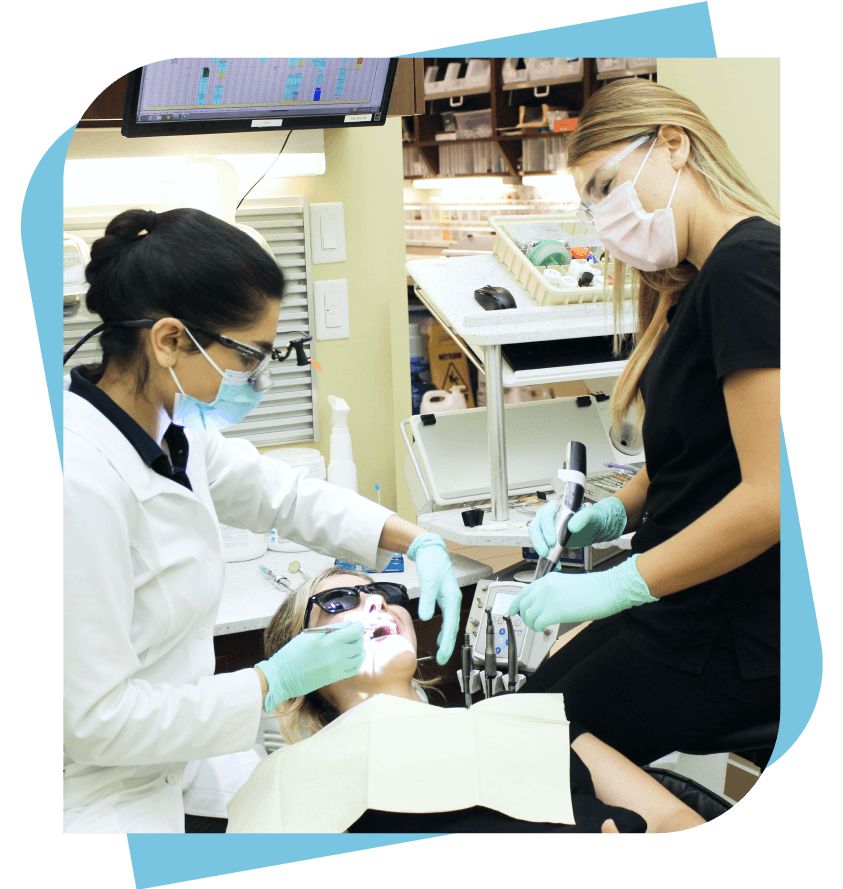
DO YOU REQUIRE
Emergency Dental Services in Kemptville, ON?
When a dental emergency strikes, our Kemptville clinic is here to provide prompt, same-day care. Don’t wait—if you’re experiencing severe pain, an injury, or another urgent dental issue, give us a call, and we’ll ensure you receive the immediate attention you need.
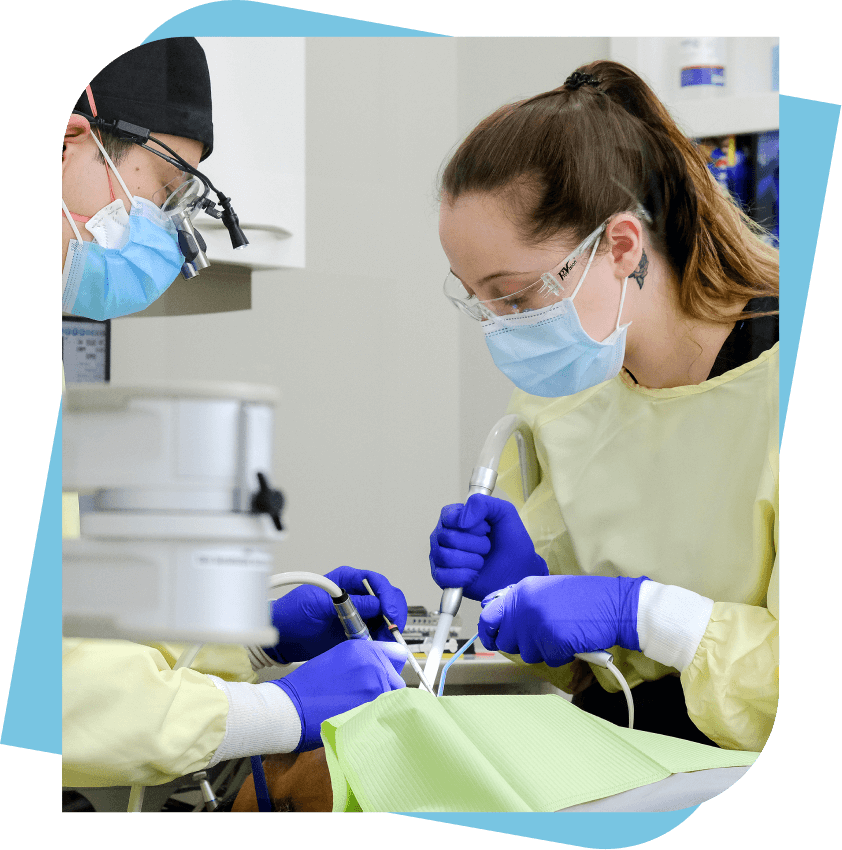
TOOTH EXTRACTIONS IN KEMPTVILLE
What Happens Before a Tooth is Extracted?
Tooth extractions are classified as either simple or surgical, depending on the tooth's accessibility and condition. Simple extractions are performed on visible teeth, while surgical extractions are necessary for teeth impacted below the gum line.
Our Kemptville team prioritizes your comfort during the procedure, using local anesthetic and offering sedation options when needed. We carefully select appropriate tools based on the tooth's location and condition, allowing for gentle loosening and removal with minimal force.
At Yazdani Family Dentistry, our combination of expertise and patient-centered care makes us the preferred choice for tooth extractions in Kemptville. We strive to ensure a smooth, comfortable experience throughout the entire process.
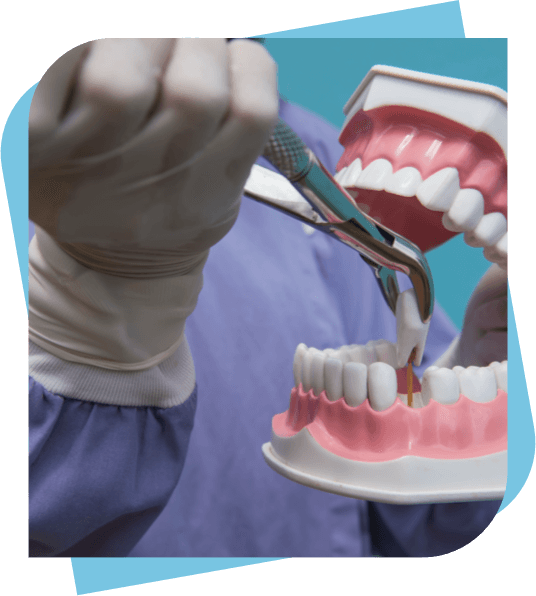
AFTER THE TOOTH EXTRACTION
Restoring Your Smile
Once a tooth has been extracted, it’s important to address the gap it leaves behind to maintain proper function and aesthetics. At Yazdani Family Dentistry in Kemptville, we offer a variety of solutions, including dental bridges, crowns, implants, and dentures. During your recovery, our dentists will closely monitor your healing process and evaluate the condition of your mouth to recommend the option best suited for you.
For expert tooth extraction services in Kemptville, trust Yazdani Family Dentistry. We provide skilled care in a safe, comfortable environment. Contact us today to schedule your appointment and begin your journey towards improved oral health.
Why Wisdom Tooth Extractions Are Necessary
Wisdom teeth, the last set of molars that typically emerge between ages 17 and 25, don’t always have enough space to grow in properly. For some individuals, these teeth can grow without issues, but for many, one or more wisdom teeth may become impacted due to limited space. Impaction can occur in several ways:
- Angled towards the adjacent tooth
- Growing at an angle toward the back of the mouth
- Sitting at a 90-degree angle within the jawbone, pressing against adjacent teeth
- Remaining trapped in the jawbone, growing straight up or down .
While some impacted wisdom teeth might not cause immediate problems, they often lead to complications later. To prevent dental emergencies and protect your oral health, it’s generally recommended to remove impacted wisdom teeth before issues arise.

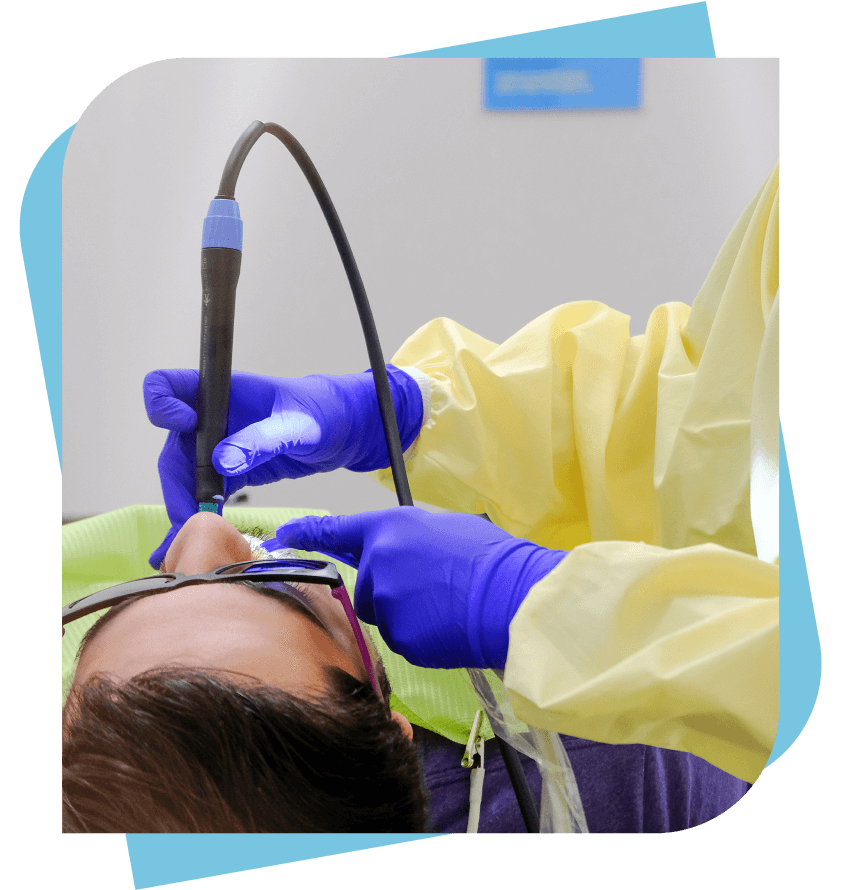
Issues Caused By Impacted Wisdom Teeth
- Pain in the mouth & jaw.
- Food and debris trapping behind the impacted tooth
- Infection or gum disease
- Tooth decay in partially erupted wisdom teeth
- Damage to the neighbouring tooth and surrounding bone structure.
- Damage to neighboring teeth and bone structure
- Cyst formation around the impacted tooth
Preventative Wisdom Tooth Extractions
Removing wisdom teeth as a preventative measure is often recommended. While impacted wisdom teeth may not cause noticeable issues immediately, they can silently contribute to oral health problems over time. Even asymptomatic impacted teeth can harbor disease and become more problematic with age. Extracting them early, when the procedure and recovery are generally easier, helps prevent future complications and ensures long-term oral health.
Preparing For The Wisdom Tooth Removal Procedure
In the days leading up to a wisdom tooth removal procedure, there are a few key steps patients should take to ensure a smooth experience and recovery:
Getting Your Home Recovery-Ready
After the procedure, patients will need time to rest and recover over the next few days. Preparing your home in advance can make this process more comfortable. Set up a space where you can relax, and stock up on soft foods and beverages that are easy to consume during the initial recovery period. Smoothies, mashed potatoes, yogurt, and ice cream are excellent options to have on hand.
Discussing Medical History
It’s important to discuss your medical history with your dentist or oral surgeon before the procedure. This includes detailing any prescription medications you’re taking and whether they can be continued leading up to the surgery. Additionally, it’s crucial to disclose any history of recreational drug or alcohol use, as these factors can influence how you respond to dental sedation. Providing this information allows your dentist to determine the safest and most effective approach for your procedure.


The Day of Your Wisdom Tooth Removal Procedure
Wisdom tooth removal is a surgical process carried out by a dentist or oral surgeon. Typically performed as an outpatient procedure, patients can return home the same day. The process involves several precise steps to ensure safety and comfort:
- Administration of Sedation
The dentist or oral surgeon administers sedation, if necessary, to ensure the patient remains comfortable throughout the procedure. - Incision in the Gums
An incision is made in the gums to expose the wisdom tooth and surrounding bone structure. - Bone Removal
If necessary, bone blocking the tooth root is carefully removed to provide access to the tooth. - Tooth Sectioning
The tooth may be divided into smaller pieces to facilitate easier removal. - Tooth Extraction
The entire tooth is removed with precision and care. - Cleaning the Extraction Site
The area is thoroughly cleaned to remove any debris from the tooth or bone. - Stitching the Site
The removal site is stitched closed to support proper healing. - Gauze Placement
Gauze is placed over the site to control bleeding and encourage a blood clot to form, aiding in the healing process.
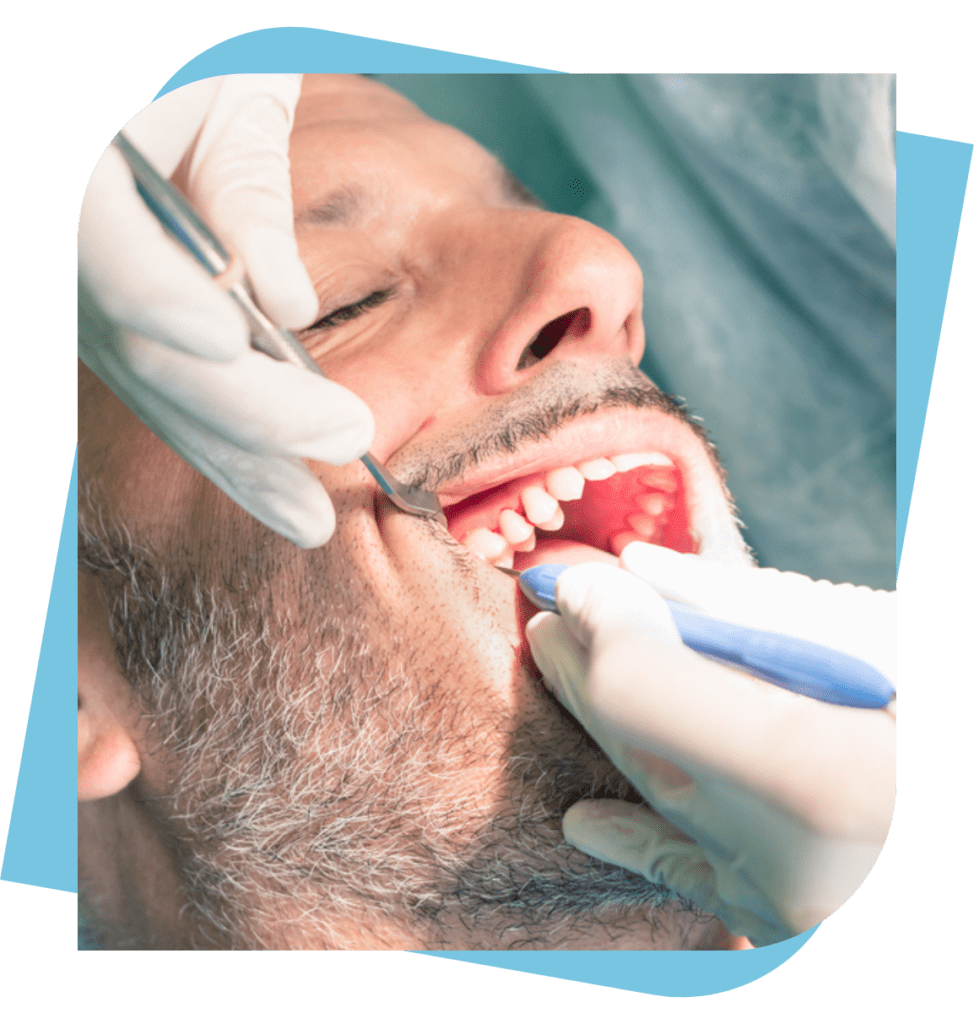
After The Wisdom Tooth Extraction Procedure
Following a wisdom tooth extraction, proper care is essential to ensure a smooth and successful recovery. Your dentist or oral surgeon will provide specific instructions tailored to your needs.
Manage Bleeding
After wisdom tooth extraction, some bleeding is normal for the first 48 hours. Follow your dentist’s instructions for changing the gauze at the extraction site. To protect the blood clot, which is crucial for healing:
Avoid excessive spitting
Don’t use straws
Refrain from sucking on candies or similar items
These precautions help ensure proper healing and reduce the risk of complications like dry socket.
Pain Management
Mild to moderate pain and discomfort are common, particularly if bone was removed during the procedure. To manage pain and swelling:
Apply an ice pack to the affected area to reduce swelling.
Take over-the-counter pain medications, such as Tylenol or Advil, as advised.
If needed, your dentist or oral surgeon may prescribe additional pain medications. Always follow their guidance on medication use to ensure safe and effective relief.
Avoid Strenuous Activity
Rest is crucial immediately after your procedure. Spend the rest of the day in bed and avoid any strenuous activities. Normal activities can usually resume the next day, but heavy lifting or intense exercise should be avoided to prevent dislodging the blood clot at the extraction site.
Food & Beverages
- Soft Foods First: Stick to soft foods such as applesauce, yogurt, and ice cream during the first 24 hours. As healing progresses, you can gradually introduce semi-soft foods based on your comfort level.
- Foods to Avoid: Steer clear of hard, chewy, hot, or spicy foods as they may irritate the extraction site.
- Hydration: Drink plenty of water to stay hydrated. However, avoid carbonated, caffeinated, hot, or alcoholic beverages for the first 24 hours. Do not use straws, as the suction can dislodge the blood clot, delaying healing.


Tobacco Use
For optimal recovery, abstain from using tobacco products. These slow the healing process and increase the risk of complications.
- Smokers: Avoid smoking for at least 72 hours.
- Chewing Tobacco: Refrain from using chewing tobacco for at least a week.
Consider using this time as an opportunity to quit tobacco altogether.
Oral Care
Proper oral hygiene is critical during the healing process:
- First 24 Hours: Do not rinse, spit, or brush your teeth to allow a stable blood clot to form.
- After 24 Hours: Brush gently around the extraction site using a soft-bristled toothbrush. Avoid direct contact with the surgical area.
- Rinse with Salt Water: Use warm salt water to rinse your mouth every couple of hours and after meals for the first week to promote healing and reduce discomfort.
When to Contact Your Dentist After Wisdom Tooth Removal
While it is normal to experience some discomfort after a wisdom tooth extraction, certain symptoms may indicate a more serious issue requiring immediate dental attention. Contact Yazdani Family Dentistry in Kemptville right away if you experience any of the following:
- Difficulty swallowing or breathing.
- Excessive or prolonged bleeding.
- Fever.
- Severe pain unrelieved by prescribed or over-the-counter pain medications.
- Swelling that worsens after two to three days.
- A persistent bad taste in your mouth that isn’t resolved with salt water rinses.
- Pus discharge from the extraction site.
- Persistent numbness or tingling.
- Blood or pus in nasal discharge.
These symptoms could be signs of complications such as infection, dry socket, or other serious issues that require prompt intervention to protect your overall health. Don’t delay—early treatment can prevent further problems and help ensure a smooth recovery.

COMFORT & PEACE OF MIND
Our Focus is on Your
Wellness
When you visit our Carleton Place dental office for your extraction appointment, know that we take your comfort and peace of mind very seriously. We’ll work closely with you to ensure you’re at ease and calm before, during, and after the procedure. Having a tooth removed can come as a visual shock to some, so our team is also trained in post-surgical guidance and will provide you with tips on taking care of the gapped area leading up to the installation of a permanent solution. We keep the patient comfortable and informed every step of the way.
Do you need a tooth extracted or want to sign up as a new patient? Contact us at Costello Family Dentistry today to get in touch with our dedicated and friendly team.


Tooth Extractions Kemptville, ON
Frequently Asked Questions
A typical tooth extraction procedure takes between 20-40 minutes, including the administration of anesthesia and any necessary stitching. The duration may be longer if multiple teeth are being removed.
No, the procedure itself doesn’t hurt. Your dentist will administer a local anesthetic to numb the area before the extraction. You may feel pressure during the procedure, but you shouldn’t experience pain.
For the first few days after extraction, stick to soft foods and liquids. Good options include soup, yogurt, and ice cream. Avoid hot foods and beverages, and don’t use straws, as the suction can dislodge the blood clot at the extraction site.
The main recovery period typically lasts 7-14 days. However, most patients can return to normal activities after 2-3 days. Complete healing of the extraction site may take longer.





